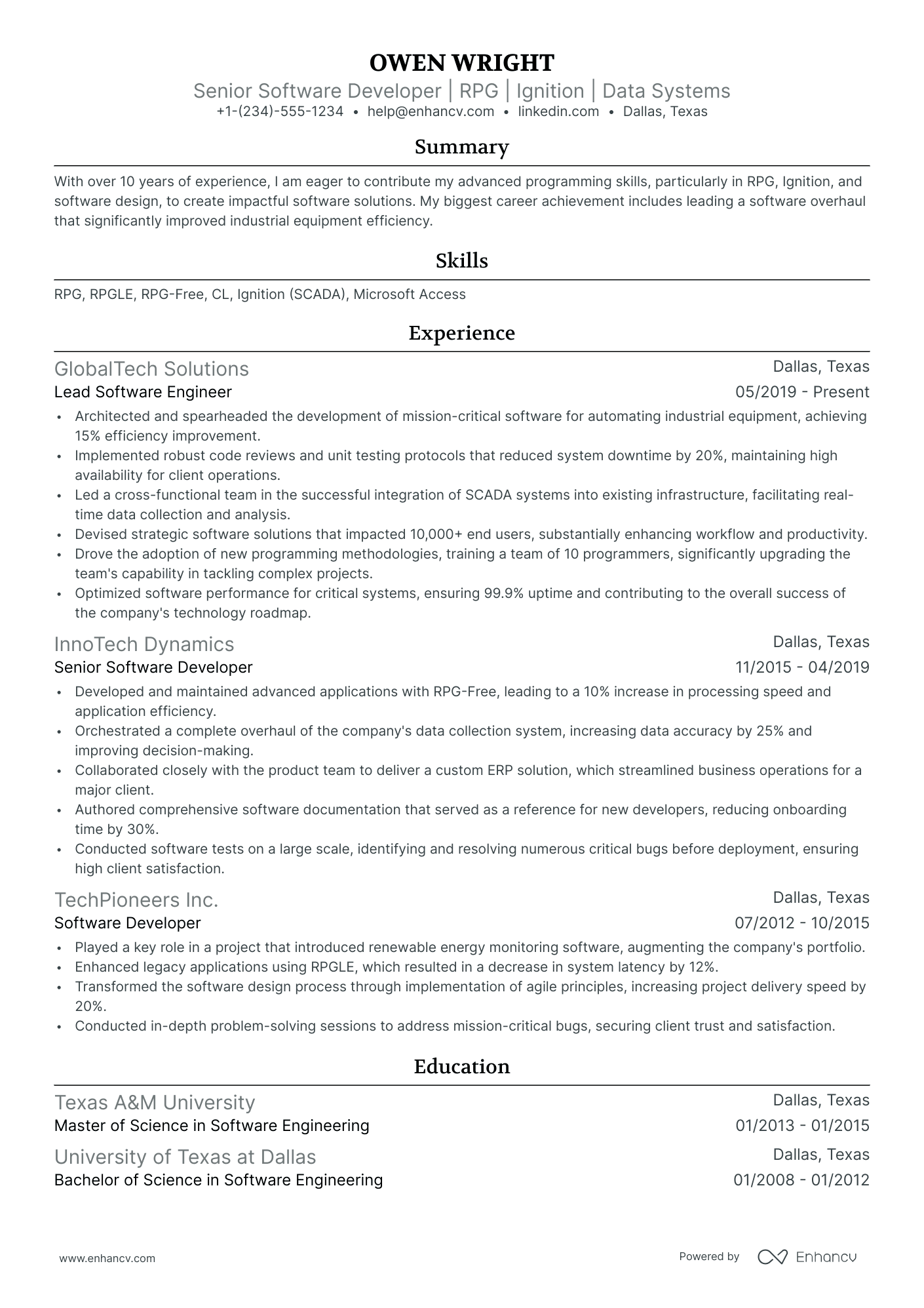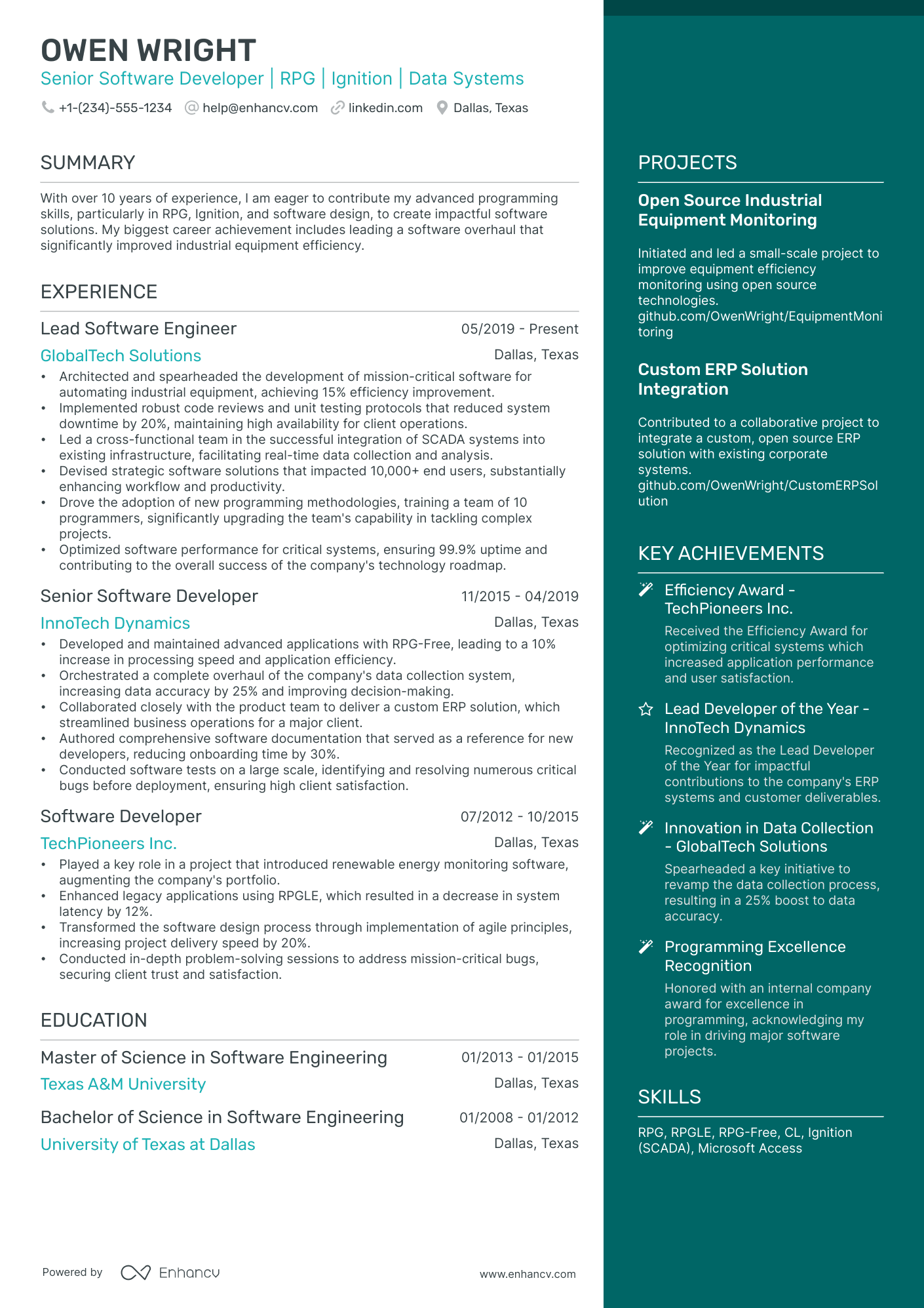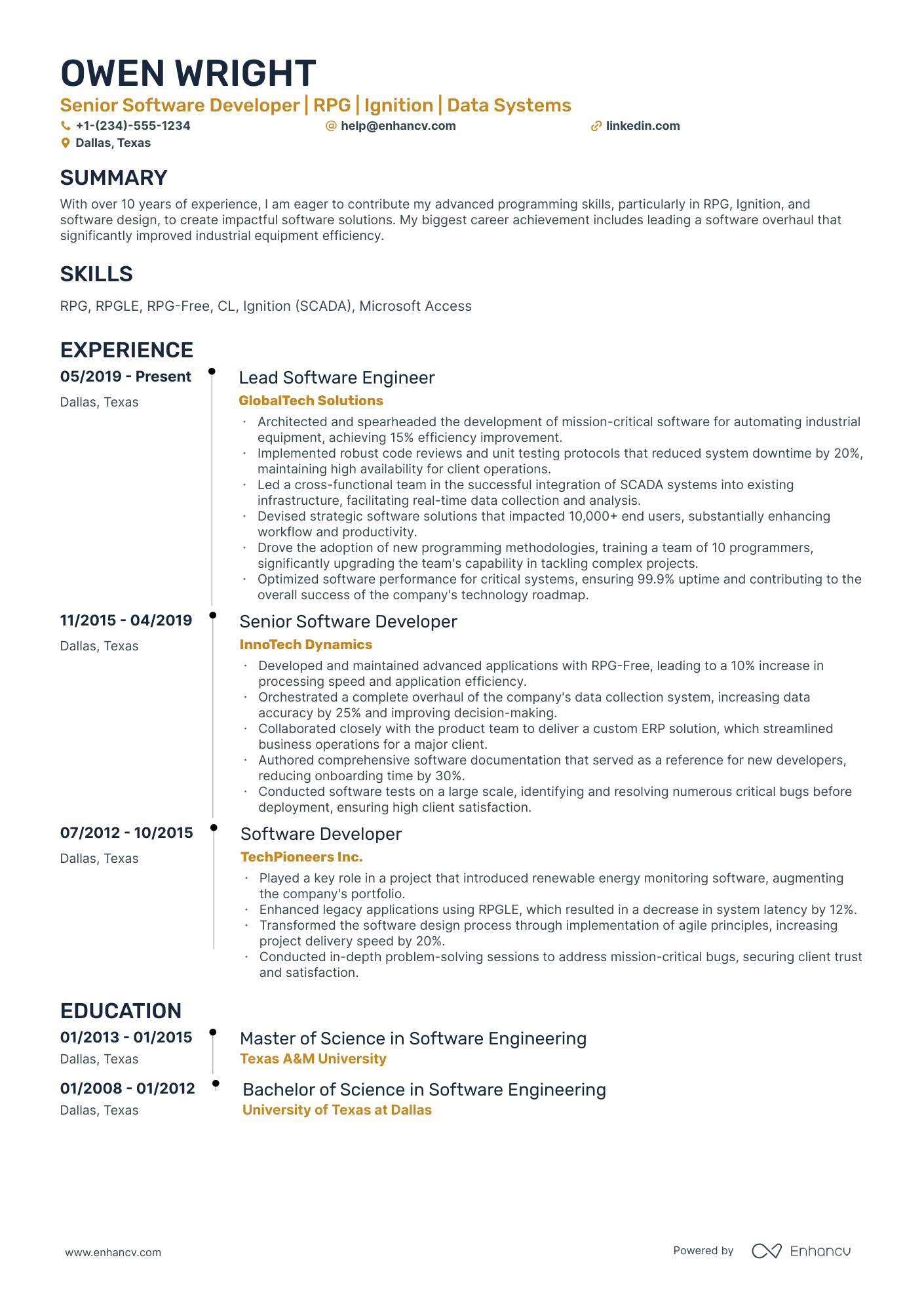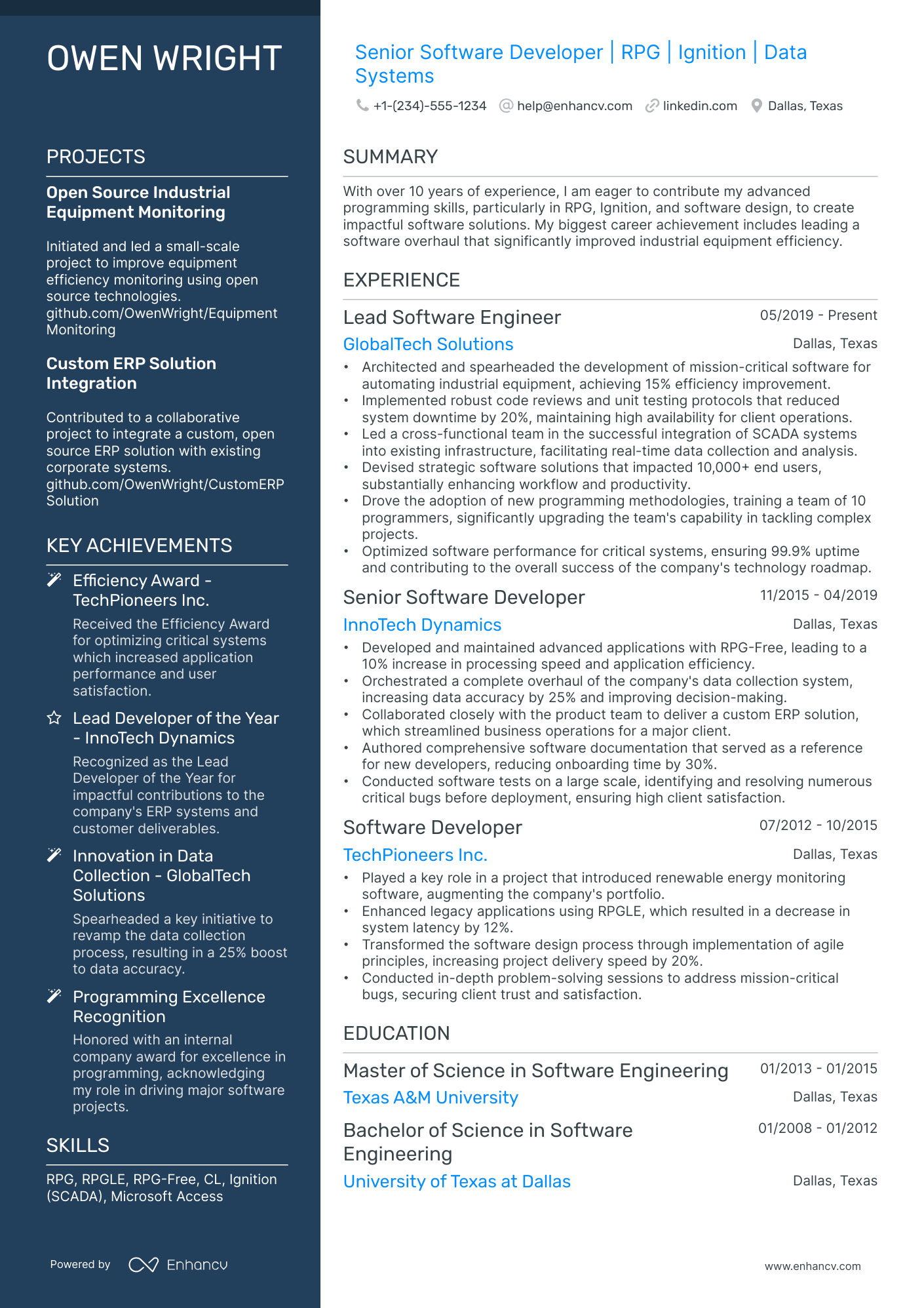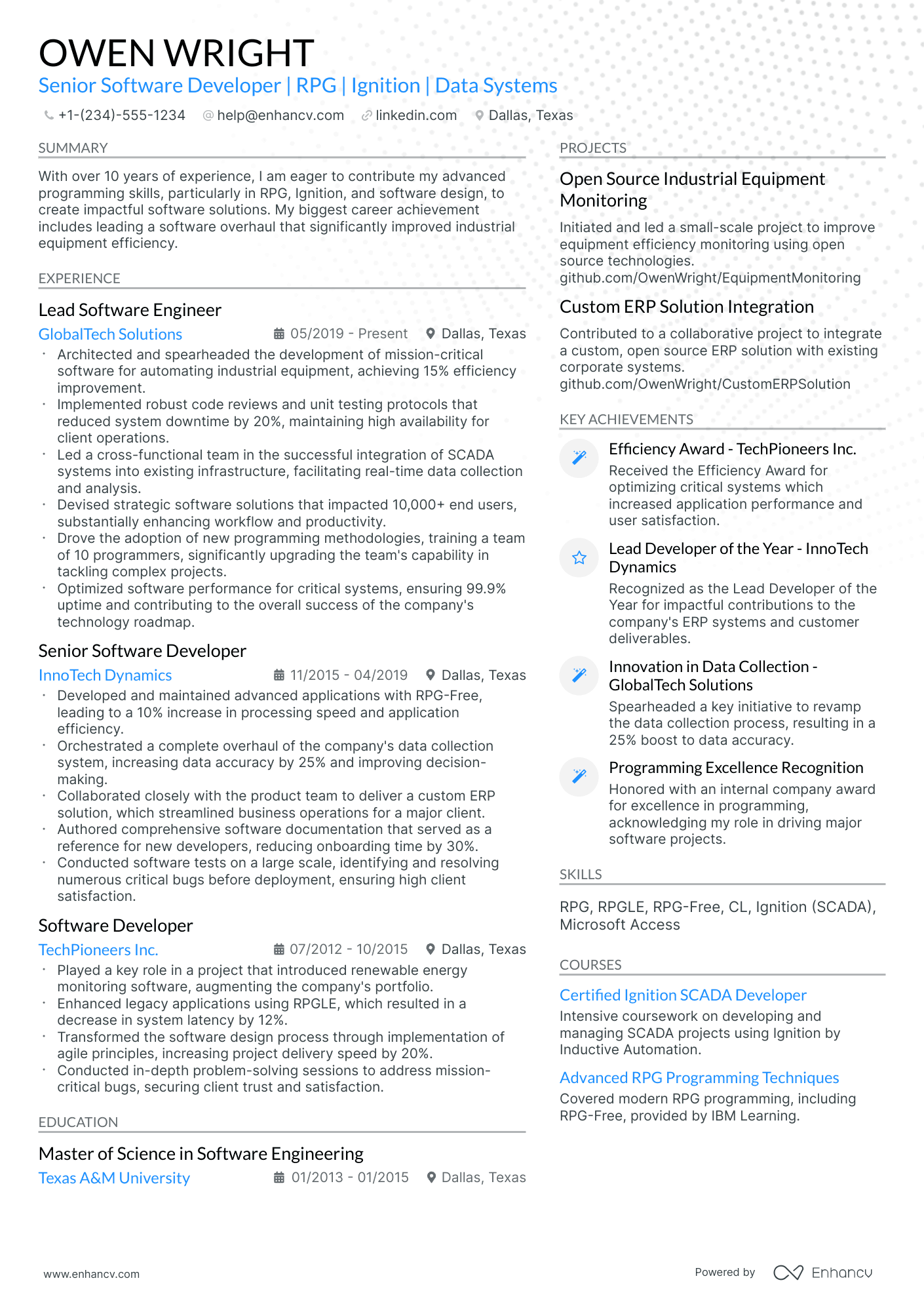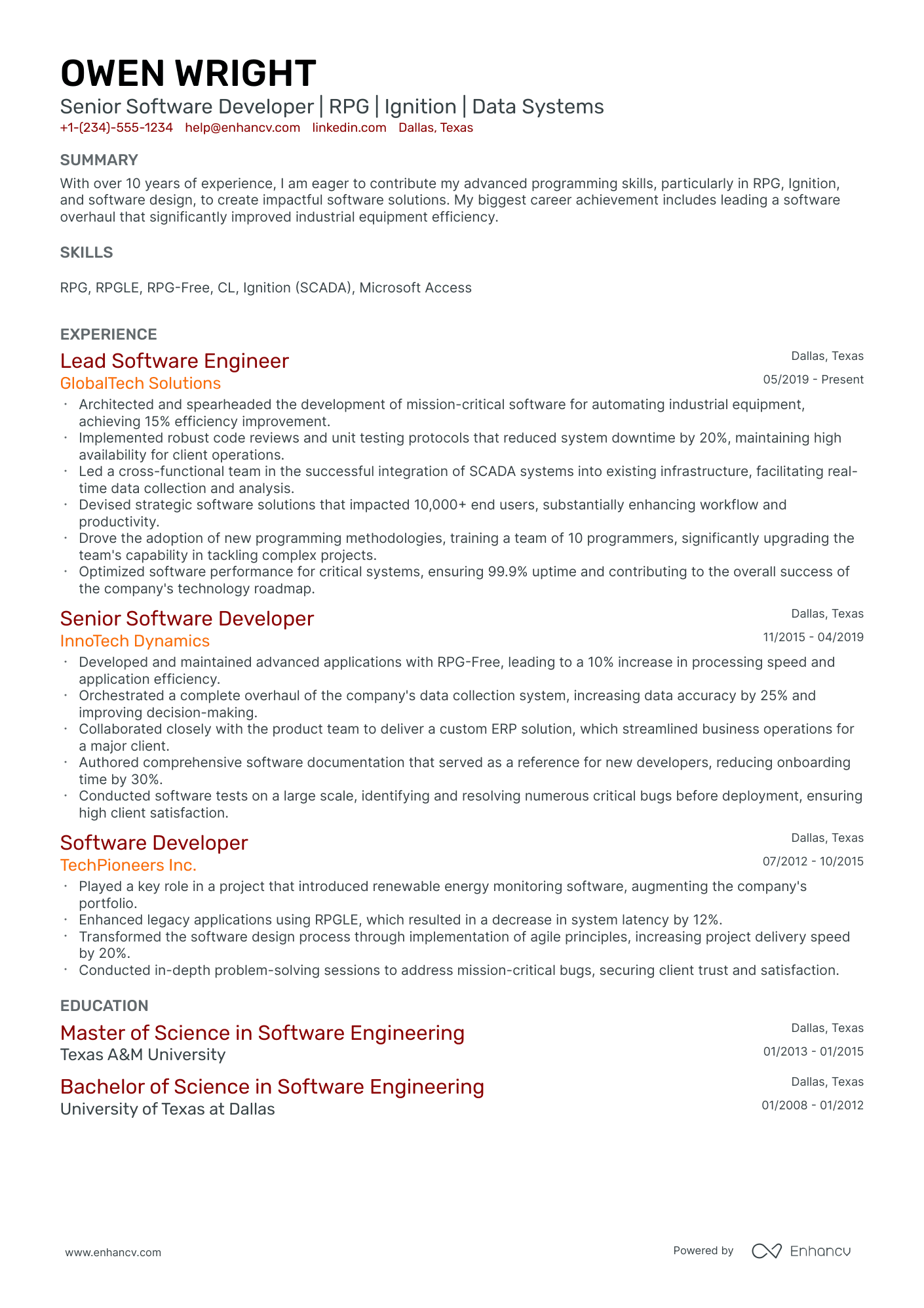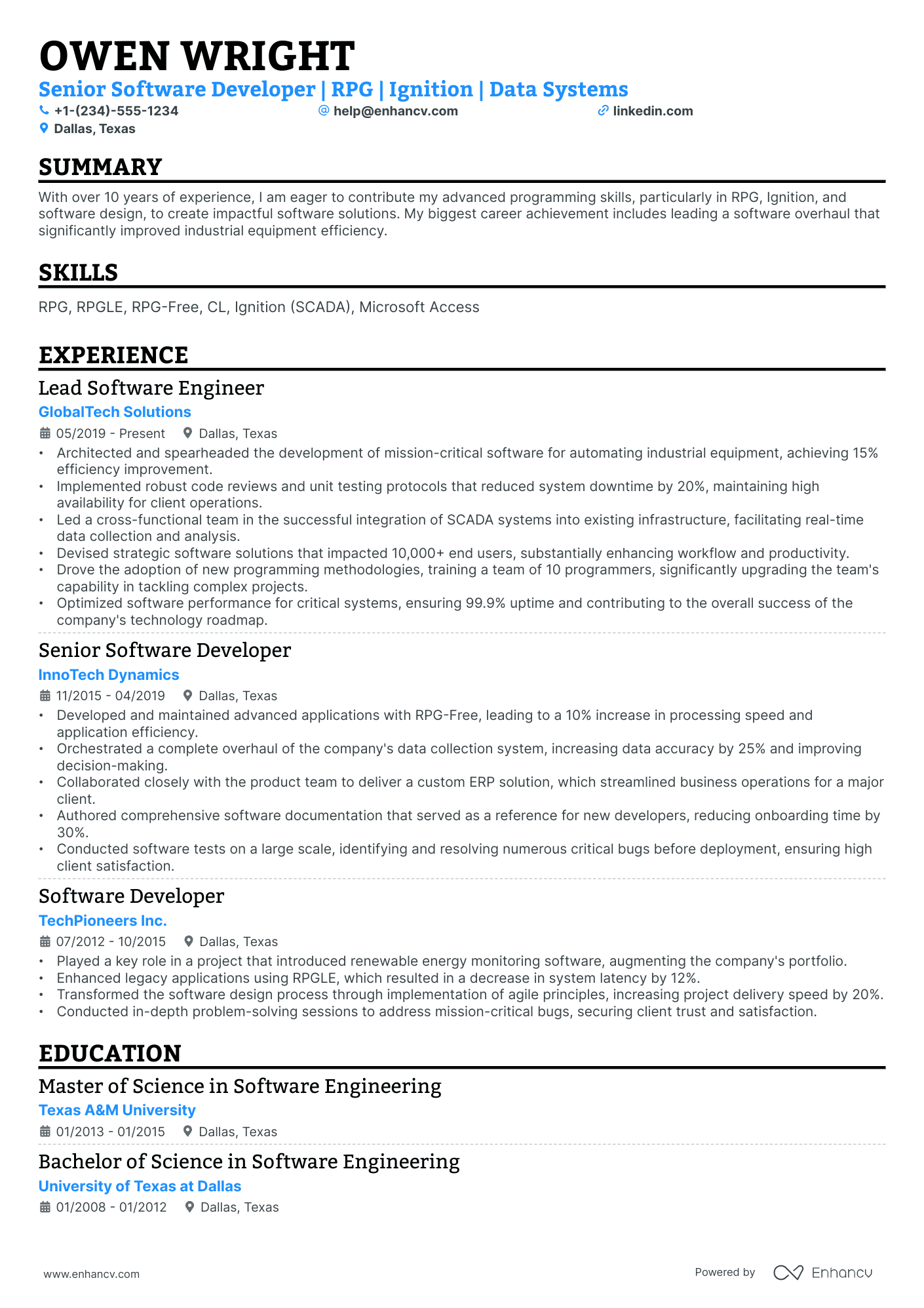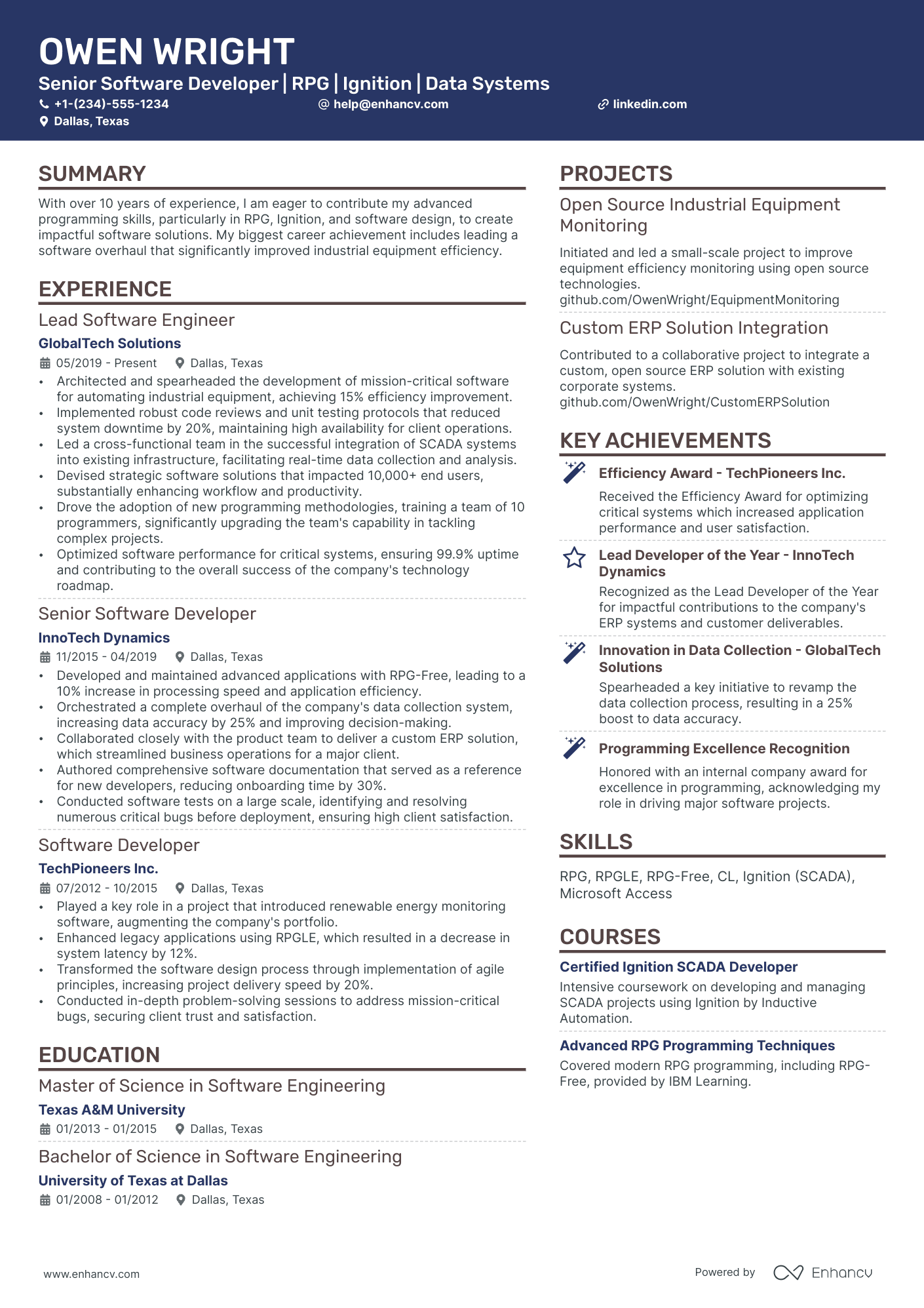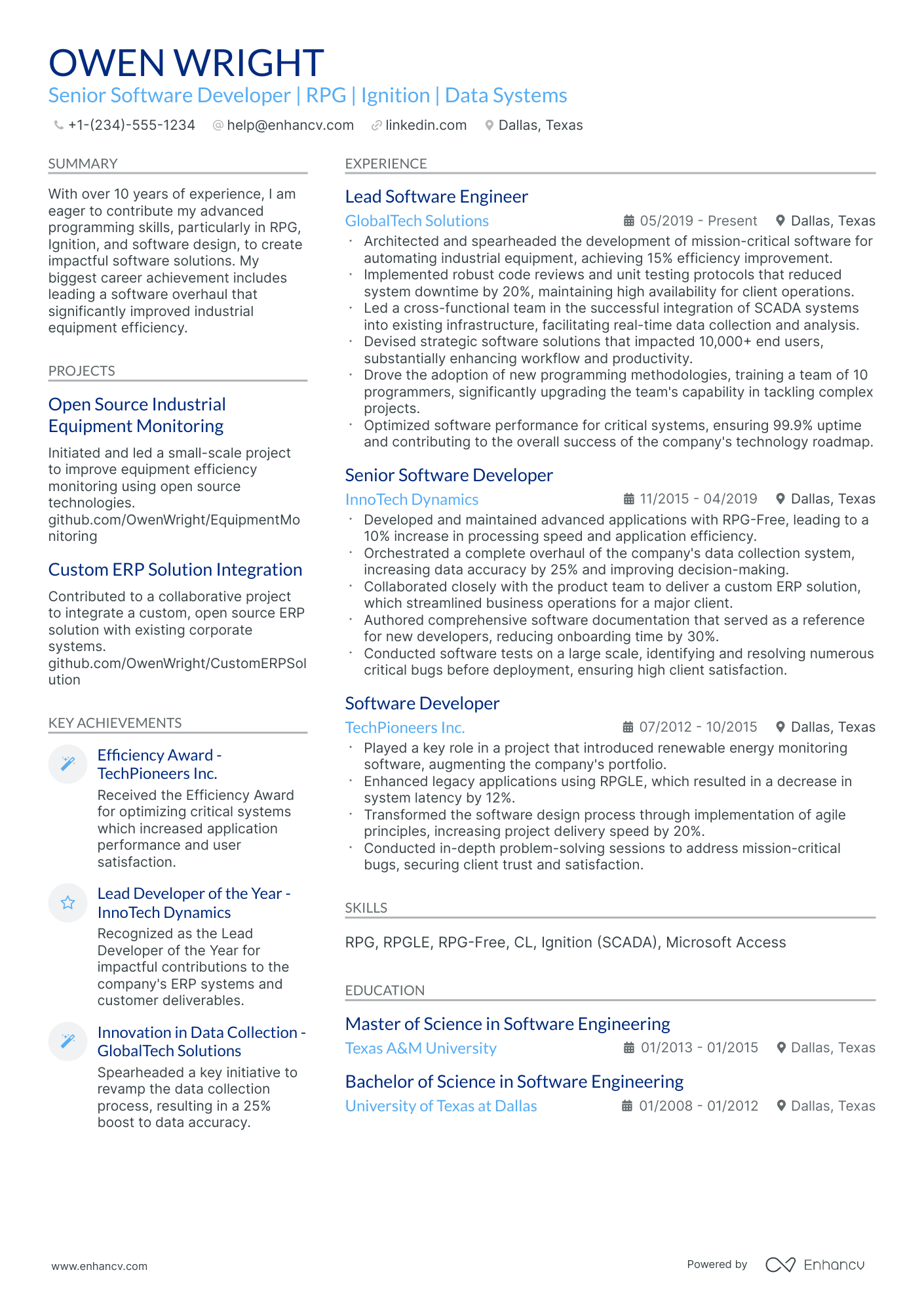As a software analyst, it can be particularly challenging to effectively showcase your technical skills and project experience without overwhelming your resume with jargon and complex details. Our guide is designed to help you strike the right balance, ensuring your resume is both comprehensible and compelling to potential employers in your field.
- Find different software analyst resume examples to serve as inspiration to your professional presentation.
- How to use the summary or objective to highlight your career achievements.
- How to create the experience section to tell your story.
- Must have certificates and what to include in the education section of your resume.
If the software analyst resume isn't the right one for you, take a look at other related guides we have:
- Software Development Manager Resume Example
- Associate Software Engineer Resume Example
- Software Engineering Manager Resume Example
- Senior Java Developer Resume Example
- SAP Abap Developer Resume Example
- Principal Software Engineer Resume Example
- Software Consultant Resume Example
- CRM Developer Resume Example
- Hadoop Developer Resume Example
- iOS Developer Resume Example
Is there a correct way to format your software analyst resume?
This is a tricky question. While skimming over your resume, recruiters will be looking at your experience and the message your profile conveys. That's why your resume format needs to be clear and concise, serving to supplement and organize your experience. Professional best practices point that the best software analyst resumes:
- Follow the reverse chronological order, where the most recent experience items are presented first . This is to keep your expertise succinct and to show recruiters your career growth over the years;
- Have a clearly defined header that includes all relevant contact information and a portfolio or a LinkedIn link. In some countries, it is acceptable to include a professional photo , so that your application is more memorable;
- Feature the most important software analyst resume sections towards the top, e.g. summary, skills, and experience. That way, recruiters can immediately find information that is relevant to the role;
- Take up no more than two pages - and two pages are the exception for more experienced professionals. Keep your expertise to the point and use your software analyst resume real estate wisely .
- Selecting modern, yet simple fonts, e.g. Rubik, Lato, etc., would help your application stand out;
- Many candidates stick with the tried-and-tested Arial or Times New Roman, but you'd want your software analyst resume to be a bit more unique;
- The ATS can read all serif and sans-serif fonts, so you should avoid fancy, formal script (or cursive) fonts.
The layout of a resume can differ by region – Canadian resumes may use a distinct format.
Upload & Check Your Resume
Drop your resume here or choose a file. PDF & DOCX only. Max 2MB file size.
PRO TIP
Bold the names of educational institutions and certifying bodies for emphasis.
The six in-demand sections for your software analyst resume:
- Top one-third should be filled with a header, listing your contact details, and with a summary or objective, briefly highlighting your professional accolades
- Experience section, detailing how particular jobs have helped your professional growth
- Notable achievements that tie in your hard or soft skills with tangible outcomes
- Popular industry certificates to further highlight your technical knowledge or people capabilities
- Education to showcase your academic background in the field
What recruiters want to see on your resume:
- Demonstrable experience with various software analysis methodologies such as requirements gathering, data flow analysis, and use case development.
- Proficiency with software analysis tools (e.g., UML tools, wireframing tools, flowchart software).
- Understanding of the full software development lifecycle, including Agile and Waterfall methodologies.
- Strong analytical and problem-solving skills specifically related to software design and development.
- Relevant certifications or training, such as Certified software analyst (CSA) or similar accreditation.
Adding your relevant experience to your software analyst resume
If you're looking for a way to show recruiters that your expertise is credible, look no further than the resume experience section.
Your software analyst resume experience can be best curated in a structured, bulleted list detailing the particulars of your career:
- Always integrate metrics of success - what did you actually achieve in the role?
- Scan the software analyst advert for your dream role in search of keywords in the job requirements - feature those all through your past/current experience;
- Dedicate a bullet (or two) to spotlight your technical capabilities and how you're able to use the particular software/technology in your day-to-day roles;
- Write simple by including your responsibility, a job advert keyword or skill, and a tangible outcome of your success;
- Use the experience section to also define the unique value of working with you in the form of soft skills, relevant feedback, and the company culture you best thrive in.
Industry leaders always ensure that their resume experience section offers an enticing glimpse at their expertise, while telling a career narrative. Explore these sample software analyst resumes on how to best create your resume experience section.
- Collaborated with cross-functional teams to analyze user requirements and translated them into system specifications, leading to the successful development of 10+ software products.
- Conducted thorough software analysis, including performance benchmarks on existing systems, and proposed optimizations that reduced average load times by 25%.
- Implemented and maintained automated testing procedures, improving test coverage by 40% and significantly reducing regression bugs in product releases.
- Spearheaded a critical software migration project that involved transitioning legacy systems to modern cloud-based platforms, completed ahead of schedule.
- Authored comprehensive system documentation, providing a reliable reference for an average user base of over 5000, enhancing their understanding and efficiency with our tools.
- Customized and fine-tuned software analytics tools to precisely meet departmental needs, facilitating a 30% improvement in workflow efficiency.
- Managed a portfolio of 15+ software applications, consistently ensuring alignment with the latest business requirements and IT standards.
- Provided expert consultancy on best practices in software development and lifecycle management, improving team productivity by 20%.
- Empowered key stakeholders by delivering insightful reports and analyses related to software performance and user engagement metrics.
- Initiated and led a comprehensive software compliance audit for the company, achieving 100% compliance with industry standards and avoiding potential fines.
- Oversaw the successful integration of a newly acquired IT asset into the main software inventory, smoothly adding functionality for 300+ end-users.
- Fostered a culture of continuous improvement by regularly reviewing and optimizing software analysis processes, leading to a 15% increase in team efficiency.
- Designed and implemented a company-wide data analysis platform that consolidated data streams, reducing redundant tasks and saving $200k annually.
- Acted as the primary liaison between the software engineering team and business units, ensuring that software solutions effectively addressed user needs.
- Optimized system resource utilization by identifying bottlenecks and recommending scalable solutions, which successfully supported a 200% increase in daily transactions.
- Collaborated on the development of a proprietary software tool that contributed to a 35% increase in project on-time delivery rates.
- Established a framework for evaluating third-party software, resulting in enhanced decision-making and a reduction in total cost of ownership by 20%.
- Facilitated the training of 100+ staff members on new software tools, dramatically increasing both adoption rates and productivity.
- Led a team of five analysts in the deployment of a new customer relationship management software, which boosted customer satisfaction scores by 18%.
- Automated data extraction and reporting processes, resulting in a reduction of manual work hours by 1,200 hours per year.
- Presented findings and strategic recommendations to senior management monthly, influencing the prioritization of IT projects and allocation of a $500k annual budget.
- Analysed and streamlined the deployment process of new software updates, achieving a 50% improvement in software release cycles.
- Developed and executed a successful training program on software usability for non-technical employees, enhancing company-wide productivity.
- Conducted competitive analysis of software market trends, providing actionable insights that directed the development strategy for 3 new products.
The following content includes information from "O*NET OnLine" by the U.S. Department of Labor, Employment and Training Administration (USDOL/ETA). Used under the CC BY 4.0 license. The data represents the top responsibilities present on the task lists for software analyst professionals.
Top Responsibilities for Software Analyst:
- Troubleshoot program and system malfunctions to restore normal functioning.
- Provide staff and users with assistance solving computer-related problems, such as malfunctions and program problems.
- Test, maintain, and monitor computer programs and systems, including coordinating the installation of computer programs and systems.
- Use the computer in the analysis and solution of business problems, such as development of integrated production and inventory control and cost analysis systems.
- Coordinate and link the computer systems within an organization to increase compatibility so that information can be shared.
- Use object-oriented programming languages, as well as client and server applications development processes and multimedia and Internet technology.
- Analyze information processing or computation needs and plan and design computer systems, using techniques such as structured analysis, data modeling, and information engineering.
- Consult with management to ensure agreement on system principles.
- Specify inputs accessed by the system and plan the distribution and use of the results.
- Expand or modify system to serve new purposes or improve work flow.
Quantifying impact on your resume
- Illustrate your expertise in data modeling and analysis by specifying the volume of data you have worked with and how it aided in decision-making.
- Detail the number of software projects you have contributed to, highlighting your role in their success.
- Mention the percentage improvements in process efficiency achieved through your analysis and optimizations.
- Quantify the savings generated for your organization or clients as a result of your software recommendations.
- Enumerate the number of analytical tools and methodologies you are proficient in, showcasing your technical versatility.
- List the number of user stories or requirements you have documented to demonstrate your thoroughness in understanding user needs.
- State the scale of the teams you have collaborated with on projects to show your ability to work in different sized environments.
- Express in numbers the training sessions or workshops you've conducted, if any, to highlight your leadership and communication skills.
Action verbs for your software analyst resume
Writing your software analyst experience section without any real-world experience
Professionals, lacking experience, here's how to kick-start your software analyst career:
- Substitute experience with relevant knowledge and skills, vital for the software analyst role
- Highlight any relevant certifications and education - to showcase that you have the relevant technical training for the job
- Definitely include a professional portfolio of your work so far that could include university projects or ones you've done in your free time
- Have a big focus on your transferable skills to answer what further value you'd bring about as a candidate for the software analyst job
- Include an objective to highlight how you see your professional growth, as part of the company
Recommended reads:
PRO TIP
The more trusted the organization you've attained your certificate (or degree) from, the more credible your skill set would be.
Bringing your software analyst hard skills and soft skills to the forefront of recruiters' attention
Hard skills are used to define the technological (and software) capacities you have in the industry. Technical skills are easily defined via your certification and expertise.
Soft skills have more to do with your at-work personality and how you prosper within new environments. People skills can be obtained thanks to your whole life experience and are thus a bit more difficult to define.
Why do recruiters care about both types of skills?
Hard skills have more to do with job alignment and the time your new potential employers would have to invest in training you.
Soft skills hint at how well you'd adapt to your new environment, company culture, and task organization.
Fine-tune your resume to reflect on your skills capacities and talents:
- Avoid listing basic requirements (e.g. "Excel"), instead substitute with the specifics of the technology (e.g. "Excel Macros").
- Feature your workplace values and ethics as soft skills to hint at what matters most to you in a new environment.
- Build a separate skills section for your language capabilities, only if it makes sense to the role you're applying for.
- The best way to balance software analyst hard and soft skills is by building a strengths or achievements section, where you define your outcomes via both types of skills.
There are plenty of skills that could make the cut on your resume.
That's why we've compiled for you some of the most wanted skills by recruiters, so make sure to include the technologies and soft skills that make the most sense to you (and the company you're applying for):
Top skills for your software analyst resume:
SQL
Java
Python
JavaScript
XML
RESTful APIs
Data Analysis Tools
Agile Methodologies
Version Control (e.g., Git)
Business Intelligence Tools
Analytical Thinking
Problem-Solving
Communication
Team Collaboration
Attention to Detail
Adaptability
Time Management
Critical Thinking
Customer Focus
Project Management
Next, you will find information on the top technologies for software analyst professonals from "O*NET OnLine" by the U.S. Department of Labor, Employment and Training Administration (USDOL/ETA). Used under the CC BY 4.0 license.
Top technologies for Software Analyst’s resume:
- Oracle Java 2 Platform Enterprise Edition J2EE
- Oracle SQL Developer
- Blackboard software
- ServiceNow
- React
- Spring Framework
PRO TIP
The more trusted the organization you've attained your certificate (or degree) from, the more credible your skill set would be.
Software analyst-specific certifications and education for your resume
Place emphasis on your resume education section . It can suggest a plethora of skills and experiences that are apt for the role.
- Feature only higher-level qualifications, with details about the institution and tenure.
- If your degree is in progress, state your projected graduation date.
- Think about excluding degrees that don't fit the job's context.
- Elaborate on your education if it accentuates your accomplishments in a research-driven setting.
On the other hand, showcasing your unique and applicable industry know-how can be a literal walk in the park, even if you don't have a lot of work experience.
Include your accreditation in the certification and education sections as so:
- Important industry certificates should be listed towards the top of your resume in a separate section
- If your accreditation is really noteworthy, you could include it in the top one-third of your resume following your name or in the header, summary, or objective
- Potentially include details about your certificates or degrees (within the description) to show further alignment to the role with the skills you've attained
- The more recent your professional certificate is, the more prominence it should have within your certification sections. This shows recruiters you have recent knowledge and expertise
At the end of the day, both the education and certification sections hint at the initial and continuous progress you've made in the field.
And, honestly - that's important for any company.
Below, discover some of the most recent and popular software analyst certificates to make your resume even more prominent in the applicant pool:
The top 5 certifications for your software analyst resume:
- Certified Software Quality Analyst (CSQA) - QAI Global Institute
- Professional in Business Analysis (PMI-PBA) - Project Management Institute
- Certified Software Business Analyst (CSBA) - International Software Certification Board (ISCB)
- International Software Testing Qualifications Board Certified Tester (ISTQB-CTFL) - International Software Testing Qualifications Board
- Agile Certified Practitioner (PMI-ACP) - Project Management Institute
The content below includes information from "O*NET OnLine" by the U.S. Department of Labor, Employment and Training Administration (USDOL/ETA). Used under the CC BY 4.0 license. The data represents the top associations for software analyst professionals.
Top US associations for a Software Analyst professional
- AFCEA International
- Association for Computing Machinery
- CompTIA
- Computing Research Association
- Cyber Degrees
PRO TIP
Mention specific courses or projects that are pertinent to the job you're applying for.
Recommended reads:
The summary or objective: focusing on the top one-third of your resume
It's a well-known fact that the top one-third of your software analyst resume is the make-it-or-break-it moment of your application. The resume summary and objective could help you further build up your professional profile.
- If you have plenty of career highlights behind your back, use the resume summary . The software analyst summary immediately focuses recruiters' attention on what matters most within your experience.
- The resume objective is the perfect choice for balancing your career achievements with your vision. Use it to state precisely how you see yourself in a couple of years' time - as part of the company you're applying for.
Both the resume summary and resume objective can be your value pitch to potential employers: answering what makes your application unique and the top choice for the software analyst role. They both have to be specific and tailored - as there's no one-size-fits-all approach to writing your software analyst summary or objective. Use the software analyst examples below as a starting point:
Resume summaries for a software analyst job
- With over 8 years of experience as a software analyst expertly utilizing SQL, Java, and Agile methodologies, I have spearheaded a complete digital transformation for a Fortune 500 company, resulting in a 40% increase in operational efficiency.
- Dynamic professional with a 5-year track record in software analysis and a strong command of .NET and Python. Successfully led the integration of advanced analytics, which boosted productivity by 30% in a globally recognized retail corporation.
- Former Data Scientist transitioning into Software Analysis, bringing a deep understanding of machine learning algorithms and big data processing, eager to apply quantitative analysis expertise to optimize software development processes.
- Experienced Project Manager making a strategic shift to Software Analysis, armed with a robust background in directing cross-functional teams and harnessing Lean methodologies to elevate software project outcomes and drive business success.
- As an enthusiastic newcomer to software analysis, I aim to contribute fresh perspectives and a keen aptitude for problem-solving, with a strong desire to master technologies such as SQL, Java, and system development lifecycles in a collaborative, fast-paced environment.
- Recent graduate with a passion for technology and problem-solving, aiming to bring a robust foundational knowledge of computer science and a rigorous academic background to the field of software analysis, with a commitment to continuous learning and advancing software solutions.
Average salary info by state in the US for software analyst professionals
Local salary info for Software Analyst.” Source: My Next Move, National Center for O*NET Development. Accessed 10/15/2024
| State | Average Salary (in USD) |
|---|---|
| US National Average | $103,800 |
| California (CA) | $124,370 |
| Texas (TX) | $107,200 |
| Florida (FL) | $99,770 |
| New York (NY) | $107,510 |
| Pennsylvania (PA) | $83,460 |
| Illinois (IL) | $99,470 |
| Ohio (OH) | $95,400 |
| Georgia (GA) | $100,120 |
| North Carolina (NC) | $105,770 |
| Michigan (MI) | $100,100 |
Miscellaneous software analyst resume sections for a more personalized approach
Your software analyst resume can reflect even more upon your personality and best qualities - that is if you decide on including a couple of additional resume sections to support your application.
Some of the best-accepted industry-wide choices include the:
- Resume projects - getting into the outcomes of your most important work, so far;
- Languages on your resume - detailing your proficiency level;
- Special recognitions - dedicated to your most prominent industry awards;
- Hobbies and interests - defining how you spend your free time.
Key takeaways
We trust that this Enhancv guide has been informative and useful. To summarize the essential points:
- Opt for a simple and readable format, focusing more on your software analyst achievements rather than just duties;
- Emphasize your accomplishments in the software analyst experience section over mere responsibilities;
- If lacking relevant experience, utilize various resume sections like education and volunteering to demonstrate your suitable skill set;
- Never overlook the significance of pertinent higher education, training, and certifications;
- Incorporate diverse sections in your resume to highlight not just your skills expertise but also your personality.
